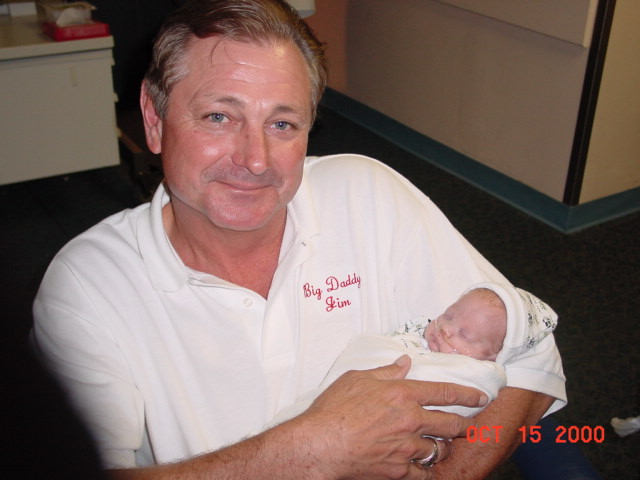
Big Daddy and Little Jackson
I have always thought of my dad as being larger than life. He is 6’4” and worked in law enforcement. I never knew him to be scared of anything. But when my son was born 16 weeks preterm, weighing just a pound and a half, my dad who had come to my rescue so many times in my life could not protect me. The tall Texan, who I never knew to show fear, did his best to look brave. But his distress was obvious. We joked about his “drive by” visits in the NICU where he stopped only briefly to peek at his grandson in the isolette and then quickly made his exit while doing his best to conceal his tears.
Watching from the sidelines
The NICU experience is overwhelming and frightening for parents—and probably doubly so for grandparents. They grieve not only for their adult child but also for their grandchild. Sharon Branson, grandmother to Brooklyn, born at 33 weeks and diagnosed with cerebral palsy at six months, described the experience as “a journey with an unknown destination; a road you have not traveled and have no idea of the twists and turns, bumps and detours you will face along the way and no map or GPS to direct you.”
Many grandparents describe a sense of ineptness as they watch from the sidelines not knowing how to help. “I wanted to fix everything for my daughter from the moment she was born,” said Doug Bennett, father to Katrina and grandfather of Bryce, born at 24 weeks gestation. “Like all parents, I learned that is not possible. I learned it slowly, the first time she was really sick and then again when she first got her heart broken. The hardest thing for me after the birth of Bryce was to have to watch my daughter realize in the first day of his life what most us get to learn over a period of years—that we cannot fix everything for them no matter how much we try.”
Ways grandparents can help
But there are things that grandparents can do to lessen the toll a NICU experience takes on their adult children and the family as a whole. I remember my mom painting my toenails, washing my pump parts and cooking me my favorite foods. She also held me while I cried and encouraged me when the road seemed too long and daunting. I needed her so much, and it meant everything to me to know I could lean on her for support.
NICU parents need and rely on their parents’ strength to help them through possibly the most difficult challenge they have faced in their lives. “There are times in life when there is a lot to be said for being stoic and this would be one of them,” said Mary Dudley, grandmother to Jackson born at 24 weeks. “When I entered Kelli’s hospital room for the first time, the first thing she said to me was ‘do not cry.’ I knew I had to be strong for her, but it was not easy.”
Connecting with other NICU grandparents
In order to be strong for their children, grandparents often find solace and strength by connecting with others who have shared their experience. “I highly recommend networking with other preemie families,” said Gay Molise, grandmother to Wilson born at 26 weeks. “Support organizations such as Hand to Hold can really prop up a family through challenging times. I can honestly say that Hand to Hold was an amazing resource and source of guidance and strength. People who went before me were continually supportive and encouraging. Someone told me early on not to borrow trouble, to take things day by day, and to stay focused on the big picture. Very wise words and I have shared them with other moms and grandmas who had a NICU experience.”
Help process information overload
In addition to providing emotional support, grandparents can also serve as an additional set of ears. Most NICU parents experience information overload. Add anxiety and fear into the mix, and information becomes even harder to process. In most hospitals, grandparents can join their child in the NICU for doctor consultations. If you are invited, go. Just remember that your primary role there is as an observer. While it is only natural to want to take control in what feels like an out-of-control situation, follow your child’s lead. As hard as it is, remind yourself that it is not your baby on the respirator and decisions are not yours to make – or even weigh in on – unless asked.
The greatest thing you can do for your child is offer comfort. As hard as it is to be “the rock,” your child needs to be allowed to unload all their fears and worries on you without judgment. At this moment they may not be in a position to comfort you in return. Be patient. “I just tried to reassure her and give her hope; she was so scared and it was hard being so far away from her,” said Sherry Fisher, grandmother to Thurston born at 27 weeks gestation.
I will never forget the joy of watching my dad hold my son for the first time. He had been so strong and brave – a quiet source of energy and hope for me during a very dark and difficult time. All his worry and anguish just seemed to melt away when he rocked Jackson that first time. Most hospitals encourage grandparents to participate as much as possible in the care of their grandchild. As overwhelming as the tubes, IVs and monitors can be and as fragile as our babies are, like any other infant, our babies need physical contact and will respond to the sound of a familiar voice and the comfort of their grandparent’s warm, loving touch.
